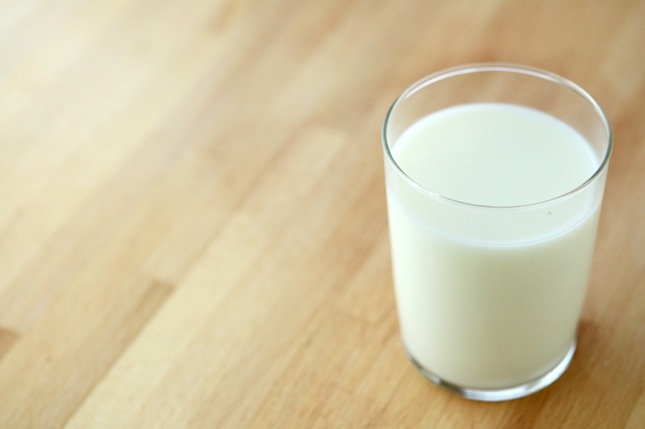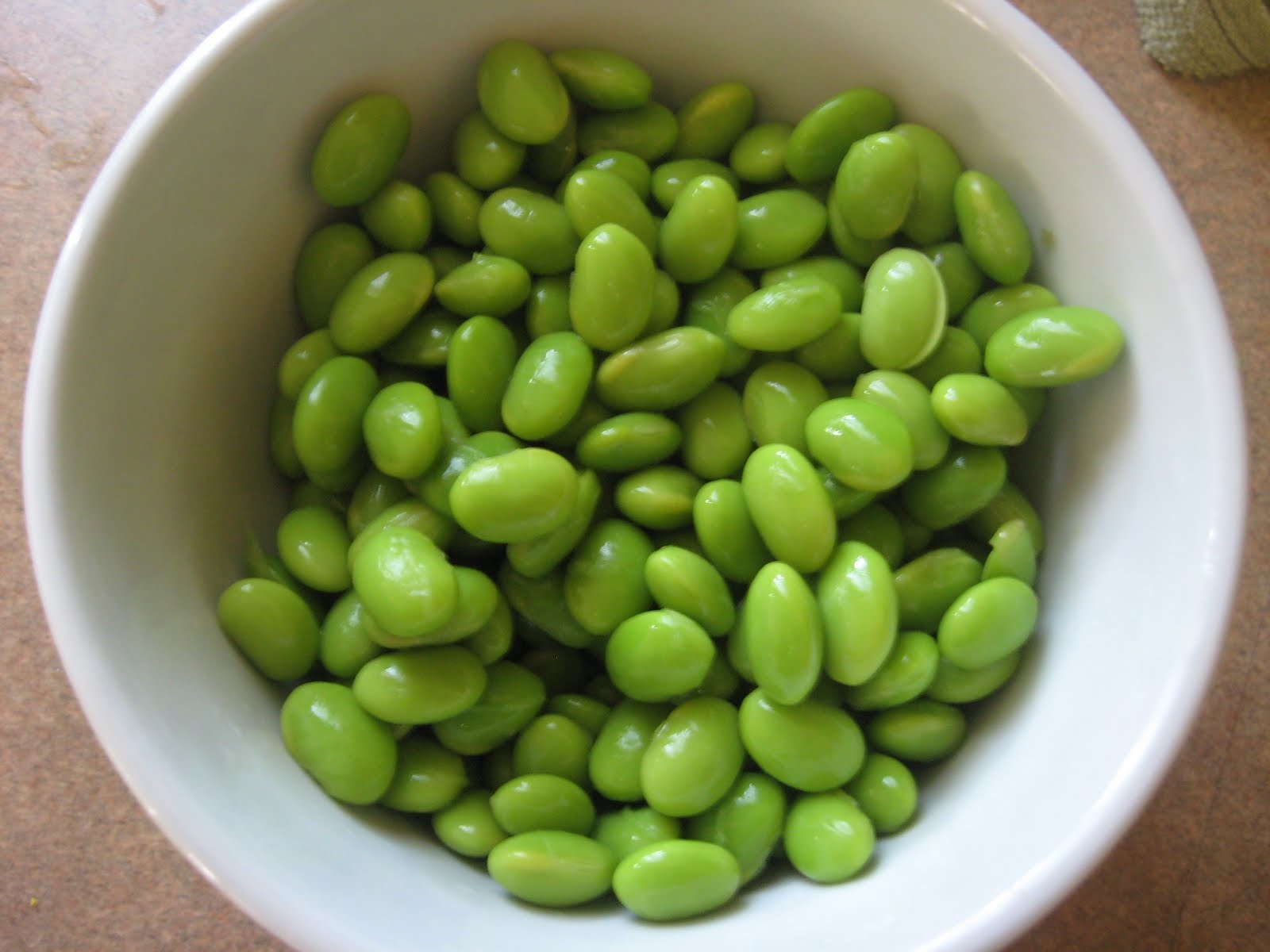Every single person I've spoken to has a very different (and strong) opinion on soy milk. Some say it’s good for you others that it’s really bad and that you should be very careful, finally others do not care and just drink it because they like it (I kinda like those kind of persons).
Personally, I discovered soy milk not a long time ago. Through my roomie Svet. She's obsessed with vanilla soy lattes. Whenever she goes out she comes back home holding a "tall one". So it was only a matter of time before she got me hooked on it.
Next thing I know, I find myself buying a big carton of vanilla soy milk at Whole Foods. I literally love the taste. It's so good.
As I didn’t know much about milk soy I decided to do a little bit of research on it. That's when I found out that there is some controversy around this product.

Being made from a bean, soy milk is said to be high in protein and fiber, but the biggest benefit is said to reside in the "isoflavones".
What are they?

Everything looks perfect right? However, if you do further research, you'll discover that there is a ton of literature against it, that, in particular, advocates upon the dangers of soy.
Dangers? Really? I thought soy was supposed to be good for my body.
Phytoestrogens or isoflavones?
Isoflavones are a class of phytoestrogens, plant-derived compounds with estrogenic activity. Soybeans and soy products are the richest sources of isoflavones in the human diet.
As mentioned before, isoflavones are thought to aid in reducing cholesterol preventing some type of cancers and aid with osteoporosis.
However, the results of randomized controlled trials suggest that substituting 50 g/day of soy protein for animal protein results in only a modest 3% reduction of LDL cholesterol. Isolated soy isoflavone supplements do not appear to have favorable effects on serum lipid profiles2.The results of numerous observational studies do not support the idea that high soy isoflavone intakes in adults are protective against breast cancer. Limited research suggests that higher intakes of soy foods early in life may decrease the risk of breast cancer in adulthood3.
Consumption of soy isoflavones may inhibit bone resorption and stimulate bone formation but the not at the rate originally thought4.
Furthermore, although scientists have been interested in the potential for soy isoflavones to prevent or inhibit the progression of prostate cancer, evidence from observational studies that soy isoflavones are protective against prostate cancer is limited and inconsistent5.

Let’s start by understanding what soy milk is.
Soy milk is a beverage made from soybeans. It’s a stable emulsion of oil, water, and protein and it is produced by soaking dry soybeans and grinding them with water. Being made from a bean, soy milk is said to be high in protein and fiber, but the biggest benefit is said to reside in the "isoflavones".
What are they?
Isonflavones are similar to the hormone estrogen produced by the human body and are supposed to be beneficial in preventing some types of cancer and osteoporosis1.Soy milk is also high in vitamins B1, B2, B6 and E (also, most of the brands you can find on the supermarket's shelves are calcium enhanced).
Everything looks perfect right? However, if you do further research, you'll discover that there is a ton of literature against it, that, in particular, advocates upon the dangers of soy.
Dangers? Really? I thought soy was supposed to be good for my body.
Opponents of soy milk claim that it contains "phytoestrogens" or chemicals found in plants. This chemical is believed to be the catalyst for the dangers of soy milk because they can affect the body in the same way that the female hormone estrogen does. This is said to negatively affect men who regularly consume soy causing problems with their thyroid and possibly even fertilityThis is where it get confusing: we were just talking about isoflavones and their health benefits and now we’re discussing phytoestrogens are their danger? Where’s the truth?
There are further researches claiming that consuming soy milk may increase the risk for endometrial cancers. This happens, in particular, when women consume high levels of phytoestrogens1
Phytoestrogens or isoflavones?
Isoflavones are a class of phytoestrogens, plant-derived compounds with estrogenic activity. Soybeans and soy products are the richest sources of isoflavones in the human diet.
As mentioned before, isoflavones are thought to aid in reducing cholesterol preventing some type of cancers and aid with osteoporosis.
However, the results of randomized controlled trials suggest that substituting 50 g/day of soy protein for animal protein results in only a modest 3% reduction of LDL cholesterol. Isolated soy isoflavone supplements do not appear to have favorable effects on serum lipid profiles2.The results of numerous observational studies do not support the idea that high soy isoflavone intakes in adults are protective against breast cancer. Limited research suggests that higher intakes of soy foods early in life may decrease the risk of breast cancer in adulthood3.
Consumption of soy isoflavones may inhibit bone resorption and stimulate bone formation but the not at the rate originally thought4.
Furthermore, although scientists have been interested in the potential for soy isoflavones to prevent or inhibit the progression of prostate cancer, evidence from observational studies that soy isoflavones are protective against prostate cancer is limited and inconsistent5.
It's worth mentioning that soy has been associated with hypothyroidism in some individuals.
It goes without saying that people who suffer from soy allergy, should avoid soy milk (and any other soy related product) at all times.
It goes without saying that people who suffer from soy allergy, should avoid soy milk (and any other soy related product) at all times.
Considerations
As a matter of fact, as of today although diets rich in soy or soy-containing products appear safe and potentially beneficial, the long-term safety of high doses of soy isoflavone supplements is not yet known6.
After all this research I think I will still enjoy (vanilla) soy milk from time to time. I just like the taste so much I can’t renounce to it completely.
Also, there has been also speculation that many of the negative reports or studies on soy milk were funded by dairy associations.
Still, I would soy milk a staple of my eating regimen. In addition, soybeans are fed to cows, pigs, chicken and, moreover, soy oil is used in many popular processed foods. It's thus very likely we're already consuming heaps of soy without even knowing it!
__________
References
1 http://voices.yahoo.com/shared/print.shtml?content_type=article&content_type_id=39587
2 http://www.ncbi.nlm.nih.gov/pubmed/16418439?dopt=Citation
3 http://www.ncbi.nlm.nih.gov/pubmed/12189192?dopt=Citation
4 http://www.ncbi.nlm.nih.gov/pubmed/15238592?dopt=Abstract
5 http://www.ncbi.nlm.nih.gov/pubmed/19211820?dopt=Citation
6http://www.ncbi.nlm.nih.gov/pubmed/19054783?dopt=Citation
As a matter of fact, as of today although diets rich in soy or soy-containing products appear safe and potentially beneficial, the long-term safety of high doses of soy isoflavone supplements is not yet known6.
After all this research I think I will still enjoy (vanilla) soy milk from time to time. I just like the taste so much I can’t renounce to it completely.
Also, there has been also speculation that many of the negative reports or studies on soy milk were funded by dairy associations.
Still, I would soy milk a staple of my eating regimen. In addition, soybeans are fed to cows, pigs, chicken and, moreover, soy oil is used in many popular processed foods. It's thus very likely we're already consuming heaps of soy without even knowing it!
__________
References
1 http://voices.yahoo.com/shared/print.shtml?content_type=article&content_type_id=39587
2 http://www.ncbi.nlm.nih.gov/pubmed/16418439?dopt=Citation
3 http://www.ncbi.nlm.nih.gov/pubmed/12189192?dopt=Citation
4 http://www.ncbi.nlm.nih.gov/pubmed/15238592?dopt=Abstract
5 http://www.ncbi.nlm.nih.gov/pubmed/19211820?dopt=Citation
6http://www.ncbi.nlm.nih.gov/pubmed/19054783?dopt=Citation



.jpg)
.jpg)
.jpg)


.jpg)
+Chicken+Enchilada+Casserole.jpg)


almond milk is a good alternative.
ReplyDeleteUnless you're allergic to nuts :(
ReplyDeleteThere is also controvertion on cow's milk, and that might sound more real, as humans are the only animals to drink milk from another animal.
ReplyDelete(except pet cats and dogs). If you really think about it, it doesn´t seem very natural! Humans are a quite artificial.
So people should drink soy in moderation as most foods.
Adam
from Catalonia (a country within spain)
Moderation, that's always a key factor!
DeletePeace
Mike
Moderation is the key. Even water can be toxic at high levels of consumption. Eat a little of everything. Humans are born to adapt. Keep it fresh and your body will respond.
ReplyDeleteWell said Steve! That's exactly my point of view.
DeletePeace
Mike
Oh my word, with all this information on the internet, it just makes everything so much more confusing? Don't think I'm going to drink any type of milk now, whether it be cow/goats or Soya... :-(
ReplyDeleteYou did all the research for me. I must thank you. I use Soy-milk exclusively since I read about all the ill effects caused by humans drinking cow's milk, and the fact that the human being is the only animal that drinks the milk of a different animal species. It is unnatural. Also, that the human being is the only animal that drinks milk after being weaned doesn't seem logical.
ReplyDeleteplease look into the Paleo/hunter-gatherer diet :)
ReplyDeleteThat was really helpful. Just had soy milk today and it tasted great. Trying to give up milk because of a skin condition.
ReplyDeleteThanks
I've heard soy can cause thyroid burnout.
ReplyDeleteAnother thing to consider is that soy milk is a highly processed food, using a lot of chemicals in its manufacture. This is not good and gives the body, especially the liver, a lot of unnecessary work. We need to get back to natural, unprocessed foods.
ReplyDeleteI think I am just going to continue drinking soy milk because I like it. There are so many people for and against it. Thanks for your blog article.
ReplyDeleteAnimal milk is rich in Vit D and animal hormones, which are similar to human hormones. If you take animal milk out of your diet, hormone and Vit D levels will consequently drop. When people switch to soy milk I suppose they ingnorantly assume that the Vit D and proteins of animal milk will somehow enter their system through the atmosphere. Doesn't happen. Whatever is taken out of the diet, must be put back in or you will suffer deficiencies that may lead to illness or other complications. Soy milk is low in Vit D and does not contain animal proteins because it is a PLANT. These things must be accounted for in a balanced diet. You must eat something that containts Vit D or you will begin to experience problems with your bones and even immunity which greatly impacts the function of the thyroid. Soy, instead of animal proteins contains, yes, phyto-estrogen. That is exactly a [sun]Light Hormone. Phyto-estrogens are not bad for you at all, no research indicates such unles consumed in GROSS, and I mean MASSIVE quantities. Phyto-estrogens are found in nearly ALL, if not ALL, plants that require sunlight for chemical processes/cellular metabolism. I have not found any SCIENTIFIC or legitimate medical research that has successfully proven soy to be Bad for you but instead has proven that the benefits of regular milk cannot be replaced by soy milk alone. People switch to soy milk because it offers health benefits when consumed intelligently, in moderation, and as one component of a balanced diet.
ReplyDelete"I suppose they ingnorantly assume that that Vit D ... will somehow enter their system through the atmosphere"
DeleteWell yes, vitamin D *can* enter one's system through the atmosphere: sunlight! A healthy dose of sunlight on one's skin (take precaution, of course; don't want to get burned) supplies one with a moderate intake of vitamin D.